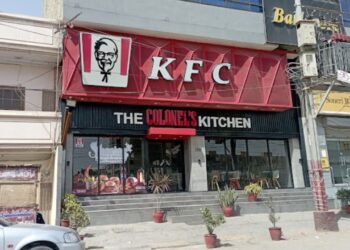ISLAMABAD – Finance Minister Ishaq Dar Friday unveiled the fifth consecutive Rs4,778 billion budget of Pakistan Muslim League-Nawaz (PML-N) government for the fiscal year 2017-18.
In his budget speech, the finance minister vowed that electricity loadshedding will be eliminated next year.
“This is the fifth budget being presented by the PML-N government, and this is an achievement for democracy,” the finance minister said in his opening remarks.
The federal government has proposed Rs 2.113 trillion Public Sector Development Programme (PSDP) for the fiscal year 2017-18, which would be utilised for various ongoing and new development schemes.
The PSDP allocations showed an increase of 26.14 per cent when compared to the development funding of Rs 1.675 trillion during last fiscal year.
Out of total PSDP, Rs 1001 billion have been set aside for the federal departments whereas a sum of Rs 1112 billion allocated for the provinces.
Reflecting on the government’s growth story over the last four years, the finance minister claimed that the government had turned the economy around.
Touting the 5.2pc growth in GDP announced yesterday, Dar also spoke of the improvement in foreign exchange reserves and reduction in loadshedding for industries. “We will be one of the largest economies in the next 20 years,” the minister claimed.
“Just four years ago, this extraordinary turnaround would have been impossible,” he said.
“We used to take loans not just for development expenditures but for other expenditures as well. These loans had become a large drag on our national growth. Weaning the country off them is no mean feat,” he said.
Education
According to details, out of Rs1,001 billion federal PSDP, the government allocated Rs 35.662 billion for Higher Education Commission.
20 billion rupees have been set aside for laptops schemes.
Health
- For National Health Programme, Rs10 billion have been allocated.
- Around Rs48.70 billion have been allocated for National Health Services, Regulations and Coordination Division.
- Hospitals will receive Rs10b.
Agriculture
- The government will provide Rs1001 billion loans to small farmers.
- There will be no Custom duty or sales tax on agriculture in next fiscal year.
- Agricultural credit will be extended at 9.9pc on Rs50,000 amount to farmers who hold 1.2m acres of land.
- Imported fertilizer will be subsidized.
- Urea will be sold at Rs1,400 per bag.
- Other fertilisers’ prices will also be kept constant through subsidies.
- The State Bank will also help link the banking system to the land record management system to facilitate farmers in securing loans.
- Tubewells will be provided subsidised electricity.
Salaries and Pensions
- A 10% ad hoc raise has been proposed in the salaries and pensions of federal employees.
- Minimum Wage has been raised to Rs15,000 from Rs14,000.
- The government will also provide Rs50,000 loans to poverty-stricken segments to set up their own businesses.
- People getting more than Rs85,000 in salary will pay tax.
- The government has allocated Rs248 billion in wake of pensions.
Defence
Rs 920 have been fixed for defence.
- Extra 10 % Zarb-e-Azb allowance for armed personnel
Energy
Rs401 billion rupees will be allocated to energy projects.
- An amount of Rs12.5 billion has been allocated for Energy for All, while Rs21b have been set aside for Diamer Basha dam.
- Dasu project Rs54b.
- LNG projects to receive Rs70b.
- Neelum Jhelum will receive Rs19b.
- Tarbela-IV will receive Rs16.4b.
- Jamshoro plant will receive Rs16.2b.
Railways
Rs45.9bn to be allocated to Railways, including for 75 new engines, 830 bogies and 250 coaches and the Peshawar to Karachi railway line.
Potable water
- Around 12.5 billion rupees have been earmarked for Safe Water for All.
- Rs36,750mn earmarked for other water projects across the country.
Gwadar & CPEC
- 31 new projects, including a new airport, 200-bed hospital and desalination plants.
- Rs180b have been allocated for CPEC projects.
Information Technology
- New IT companies will be exempted from income tax for the first three years.
- An IT park is being established with the help of South Korea.
- IT exports from Gilgit, Fata and will be exempted from sales tax.
- Withholding tax on mobile phones to be reduced from 14pc and custom duty on mobile phone sets will be cut to Rs650 per set.
BISP
The Benazir Income Support Programme (BISP) will be allocated Rs121b for 5.5 million beneficiaries.
Total Expenditure
An amount of Rs4,753 billion has been allocated for total expenditures in the next fisacal year.
Budget deficit
Budget deficit will be limited to 4.02pc of GDP, contingent on spending on the ‘war against terrorism’.
Industries
- Zero-rated schemes for textiles, leather and other sectors will be continued.
- To promote textiles, cotton hedge trading will be introduced. A brand development fund will also be created.
- An online b2b and b2c portal for textile trading will be introduced.
- Custom duty on raw hides will be eliminated.
Housing & Infrastructure
- For Roads development, an amount of 3.20 trillion has been allocated.
- Government will provide guarantees for housing loans for up to Rs1 million.
- Pakistan Development Fund will be established.
- Pakistan Infrastructure Bank will be established to provide loans to private infrastructure projects.
IDPs rehabilitation
The government also earmarked Rs45 billion for Relief and Rehabilitation of IDPs, and Rs45 billion for Security Enhancement.
Youth loan programmes
About Rs20 billion have been allocated for Prime Minister’s Youth Initiative.
Kashmir, GB & FATA
Rs45.6bn for projects Azad Jammu & Kashmir, Gilgit Baltistan and Fata.
Taxes
- The government has fixed a target to raise taxes to 15pc of GDP.
- Corporate sector will get relief in the form of a 30% effective corporate tax rate.
- Islamic banking will face the same taxing regime as commercial banks.
- Withholding taxes on new car registrations have been cut for lowest three categories.
- Cement FED will be increased from Rs1 per kilogramme to Rs1.25/kg,
- Commercial import of clothing will be taxed at 6pc.
- Steel sector will be taxed at 10.5% compared to the current 9 %.

















